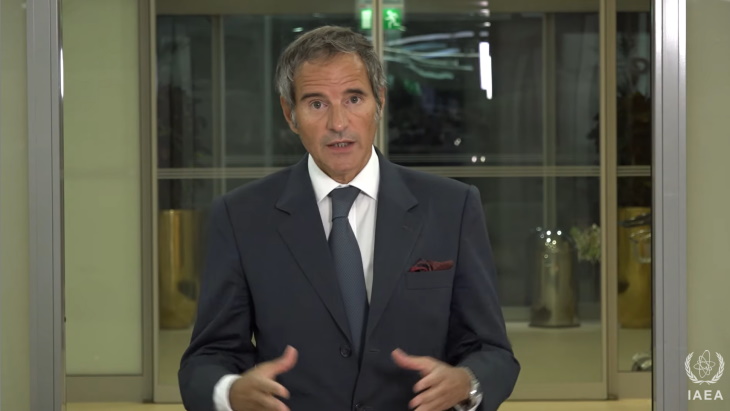Up until 23 February this year, the IAEA has verified and monitored the implementation by Iran of its nuclear-related commitments under the 2015 Joint Comprehensive Plan of Action. However, since that date, these activities have been seriously undermined as a result of Iran's decision to stop the implementation of its nuclear-related commitments under the JCPOA, including the Additional Protocol.
During his trip to Tehran, Grossi met with Mohammad Eslami, vice president and the head of Atomic Energy Organisation of Iran (AEOI). Following their meeting, Grossi and Eslami issued a joint statement.
"In this meeting the parties recalled and reaffirmed the spirit of cooperation and mutual trust and its continuation and emphasised on the necessity of addressing the relevant issues in a constructive atmosphere and exclusively in a technical manner," it said.
It added: "IAEA's inspectors are permitted to service the identified equipment and replace their storage media which will be kept under the joint IAEA and AEOI seals in the Islamic Republic of Iran. The way and the timing are agreed by the two sides."
The statement also calls for continued "mutual interactions and meetings at relevant levels" between Iran and the IAEA "in the framework of the existing cooperation." To this end, Eslami will meet Grossi at the sidelines of the upcoming IAEA General Conference in Vienna. The IAEA Director General will also visit Tehran in the near future to hold high-level consultations with the Iranian government "with the aim of enhancing cooperation between Iran and the IAEA in different fields and discussing current issues of mutual interest."
Speaking to journalists on his return to Vienna, Grossi said he believes his trip "helps keep the process in a good direction and will hopefully bring us closer to solve some of the important issues that we still have to solve." He said his primary concern when travelling to Iran was that there had been a "major" communication breakdown, "something we cannot afford having". However, he added, "I think this was solved."
In his Introductory Statement to the IAEA Board of Governors today, Grossi said the presence of multiple uranium particles of anthropogenic origin at three locations in Iran not declared to the Agency, as well as the presence of isotopically altered particles at one of these locations, is "a clear indication that nuclear material and/or equipment contaminated by nuclear material has been present at these locations".
Iran has still not provided the necessary explanations for the presence of the nuclear material particles at any of three locations where the IAEA has conducted complementary accesses, he added. Nor has Iran answered the IAEA's questions with regard to another undeclared location or clarified the current location of natural uranium in the form of a metal disc.
"I remain deeply concerned that nuclear material has been present at undeclared locations in Iran and that the current locations of this nuclear material are not known to the Agency. And I am increasingly concerned that, even after some two years, the safeguards issues outlined above in relation to the four locations in Iran not declared to the Agency, remain unresolved," Grossi said.
"I reiterate the requirement for Iran to clarify and resolve these issues without further delay by providing information, documentation and answers to the Agency's questions. The lack of progress in clarifying the Agency's questions concerning the correctness and completeness of Iran's safeguards declarations seriously affects the ability of the Agency to provide assurance of the peaceful nature of Iran's nuclear programme.
"I hope that through a direct, cooperative and productive dialogue with the new Government of the Islamic Republic of Iran these urgent matters can be addressed."





_47120.jpg)

_23621.jpg)






